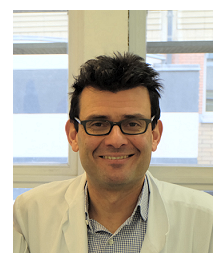Personalization of treatment of HER2+ breast cancer
Press release (28/05/2018)
A patient’s immune response makes it possible to personalize treatment of HER2 positive breast cancer.
Brussels, 28 of May 2018 - Researchers at the Jules Bordet Institute published last week, in the Journal of the National Cancer Institute, a study permitting the advance identification, among women suffering from an HER2-positive breast cancer, of those who will and will not respond positively to preoperative chemotherapy in association with two therapies that target the HER2, namely trastuzumab and pertuzumab. This study makes it possible to refine treatment for these patients and opens up new prospects for researchers. 
Dr Michail Ignatiadis, Head of the Medical Oncology Clinic at the Jules Bordet Institute, in cooperation with the JC Heuson Breast Cancer Translational Research Laboratory, headed by Professor Sotiriou, and the Roche-Genentech biomarker team, carried out a translational study on the basis of the Tryphaena clinical trial. The Tryphaena clinical trial studied the effectiveness and tolerance of preoperative chemotherapy in association with two therapies that target HER2 - trastuzumab and pertuzumab - among 225 women suffering from an HER2-positive breast cancer. The study analysed the clinical future of patients treated with preoperative chemotherapy in association with trastuzumab and pertuzumab on the basis of two criteria: the quality of the patient's immune response against the tumour before any treatment and the pathological response to the preoperative treatment at the time of the operation.
The study's objective? To identify, before commencing a preoperative chemotherapy treatment in association with trastuzumab and pertuzumab, the profile of women who will have a favourable clinical future.
The researchers analysed the quality of the immune response of each patient before the treatment. This involved measuring the number of tumour-infiltrating lymphocytes (TILs) entering the initial tumour of an HER2-positive breast cancer, these being biomarkers that will boost the effectiveness of the neoadjuvant treatment (treatment administered before the operation). At a second stage the researchers analysed, in these same patients, the quality of their pathological response to the treatment with preoperative chemotherapy in association with trastuzumab and pertuzumab.
The study shows that when the patient's TIL levels are high and there is a full pathological response to the treatment, meaning that the initial tumour has disappeared totally at the time of the operation, there is a lower risk of recurrence. The treatment as proposed today is therefore effective and sufficient for these patients. On the other hand, when the TIL level of the patient is low or non-existent and/or the initial tumour has not disappeared totally at the time of the operation, the study shows a high risk of recurrence.
With this study we are moving towards a refining of breast cancer treatments. It concludes that the initial percentage of TILs and the pathological response to the standard preoperative treatment may provide prognostic information that make it possible to identify women for whom neoadjuvant chemotherapy in association with trastuzumab and pertuzumab may not suffice and for whom an intensification of treatment will be considered. This is important information for researchers and clinicians as it may help to target women for whom new combination treatments such as HER2 targeted therapy and immunotherapy will need to be tested.
- Study reference: Tumour infiltrating lymphocytes in patients receiving
trastuzumab/pertuzumab-based chemotherapy: A TRYPHAENA substudy - Link : https://academic.oup.com/jnci/advance-article/doi/10.1093/jnci/djy076/4999669
Financing: With the support of the Friends of the Jules Bordet Institute and the FNRS
- Press Contact (Institut Jules Bordet)
- Ariane van de Werve
- GSM : +32 (0)486 17 33 26
- Email : ariane.vandewerve@bordet.be
- Alexandra Cazan
- GSM : +32 (0)493 16 74 79
- Email : alexandra.cazan@bordet.be
- Ariane van de Werve